Spring 2021
NIDCR News
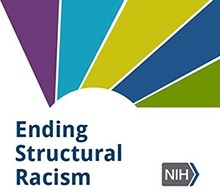
NIDCR Director Rena D’Souza, DDS, MS, PhD, said in a statement that there is no place for structural racism in biomedical research, echoing remarks from NIH Director Francis Collins, MD, PhD, in his announcement of a new NIH initiative—called UNITE—to end racial inequities in biomedical research. Through UNITE, NIH seeks to better understand stakeholder experiences, improve biomedical research culture and structure, spearhead new research on health disparities, and enhance transparency and communication with internal and external stakeholders.
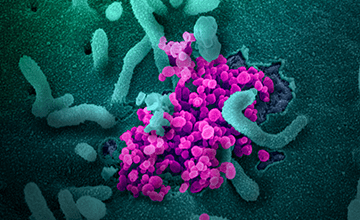
Since the start of the pandemic, NIDCR has issued about $4 million in supplemental funding for basic and clinical studies to understand COVID-19 in the context of dental, oral, and craniofacial health. Additional support is expected during fiscal year 2021. These projects address a range of topics, such as minimizing infection risk in dental environments and improving SARS-CoV-2 detection in saliva. In addition, as part of the trans-NIH initiative known as Rapid Acceleration of Diagnostics Radical (RADx-rad), NIDCR will administer six new RADx-rad projects. For details about ongoing research and COVID-19-related funding opportunities and notices, visit NIDCR’s COVID-19 webpage.

NIDCR is seeking outstanding applicants for the position of deputy director, to provide leadership and work in close collaboration with the NIDCR director to oversee all aspects of NIDCR’s $485 million budget, including planning, oversight, and allocations of the institute’s over 500 person staff. Applications must be received by 11:59 pm ET on Monday, May 3, 2021.
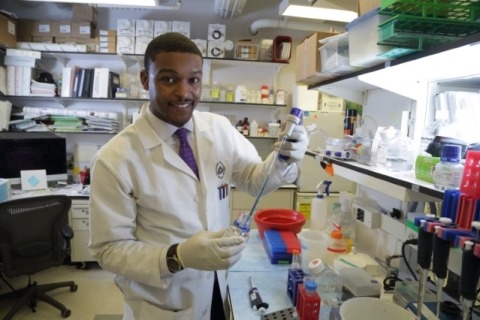
NIDCR has new openings for a hospital-based dentist for a staff clinician position and for a postdoctoral researcher in the field of immunology and mechanobiology with expertise in confocal microscopy. Learn more on NIDCR’s Job Openings page.
Science Advances

An international team of scientists led by NIDCR’s Blake Warner, DDS, PhD, MPH, and Kevin Byrd, DDS, PhD, of the American Dental Association Science and Research Institute, found evidence of SARS-CoV-2 infection in the mouth, particularly the salivary glands. As described by Warner in a video interview, the results suggest that infected oral cells are a likely source of infectious virus in the saliva, and that the presence of virus in saliva is connected to taste loss in people with COVID-19. The study provides a foundation for better understanding the mouth’s involvement in COVID-19 and could inform strategies to reduce viral transmission within and outside the body.
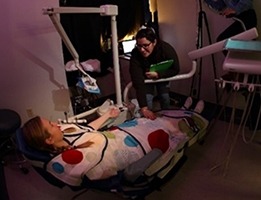
With NIDCR support, a multidisciplinary research team that includes occupational therapists and dental clinicians is creating soothing dental environments for children with autism spectrum disorder (ASD). In a recent review article, the scientists lay out suggestions for reducing anxiety in children with ASD during dental visits to reduce their risk for poor oral health. Some strategies include preparing sensory-friendly settings and reading social stories with pictures to prepare children for upcoming dental procedures.

A team led by NIDCR scientists discovered a new genetic disorder characterized by developmental delays and malformations of the brain, heart, and facial features. The disorder is caused by a mutated version of the OTUD5 gene, which interferes with key steps in embryo development. As the scientists discuss in a video interview, the newly identified pathway may be essential for human development and could underlie other disorders that are present at birth.
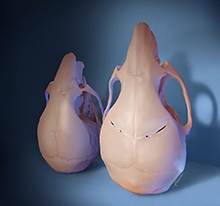
Researchers regenerated parts of the skull with stem cells and reversed learning and memory deficits in mice with craniosynostosis, a condition that leads to abnormal growth of the skull and thinking and learning problems in humans. Current treatment requires complex surgery within the first year of life, but skull defects often return afterward. The study, supported by NIDCR, could pave the way to more effective and less invasive therapies for children with craniosynostosis.

NIH scientists found that an overactive immune response leaves the oral cavity vulnerable to fungal infections in people and mice with genetic defects that cause a rare autoimmune disease. The team, including NIDCR scientists, say the discovery could lead to better therapies for fungal infections in patients with the rare disease and other conditions while providing insight into immune mechanisms in other mucosal tissues.

Immunologist Roxane Tussiwand, PhD, recently joined NIDCR as an NIH Stadtman Investigator. She studies how blood-forming stem cells are shaped by their environment into the various types of mature immune cells that defend the body. Her work could shed light on infectious diseases, autoimmune disorders, and cancer, which touched her own family.
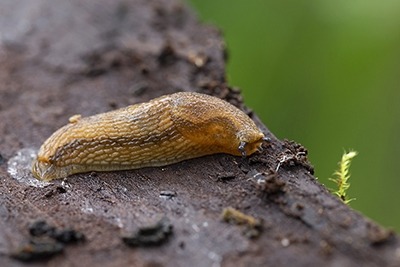
Researchers engineered a new type of surgical adhesive that is stretchy like rubber bands and sticky in wet environments. This nature-inspired material, developed with long-term NIDCR support, is an unexpected offshoot of basic research that may help patients heal better after injury or surgery. With further validation and optimization, the adhesive may one day find use in dental practices as a substitute for stitches or as a wound barrier to protect bone grafts.

Scientists are adapting a surgical bone glue to deliver non-addictive, locally acting pain medicine directly to the site of a wisdom tooth removal. The study, supported by NIDCR and the NIH Helping to End Addiction Long-term Initiative, aims to reduce the need for opioid prescriptions in young patients, in line with the initiative’s goal of finding long-term scientific solutions for the opioid epidemic.
Grantee News
Scientists Identify Molecular Pathway That Helps Moving Cells Avoid Aimless Wandering
Deactivating Cancer Cell Gene Boosts Immunotherapy for Head and Neck Cancers
The Scarred Villain: Study Explores Neurocognitive Basis of Bias Against People Who Look Different
Study Reveals Cause of Common Zika Virus Birth Defect
NIH/HHS News
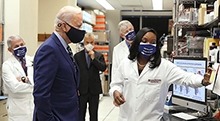
US President Joseph R. Biden, Jr. visited NIH in February for a tour of the Dale and Betty Bumpers Vaccine Research Center and delivered remarks acknowledging the contributions of NIH staff in combatting the COVID-19 pandemic. The President referred to COVID-19 vaccines as “a dose of hope” and emphasized the importance of following the science to end the pandemic. The event comes on the heels of Vice President Kamala Harris’ visit to NIH for her second dose of vaccine and a virtual visit by First Lady Jill Biden, EdD, with the National Cancer Institute.
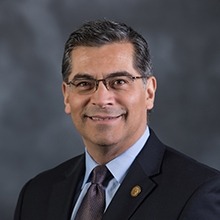
Xavier Becerra, JD, was sworn in as the secretary of HHS on March 19. Prior to joining HHS, Becerra served as the Attorney General of California since 2017 and as a member of the US House of Representatives since 1993. He earned his bachelor’s degree in economics from Stanford University and his juris doctor from Stanford Law School.
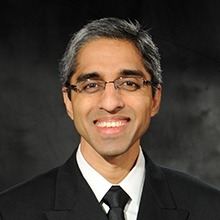
Vivek Murthy, MD, MBA, was sworn in as the 21st US Surgeon General by HHS Secretary Xavier Becerra on March 25. Murthy previously served as the 19th Surgeon General. Prior to his roles as Surgeon General, Murthy practiced internal medicine and conducted research on vaccine development and inclusivity in clinical trials. He received his bachelor’s degree from Harvard, his MBA from Yale University, and his MD from the Yale School of Medicine.
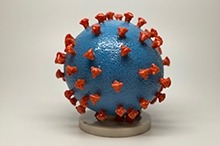
Some people who have been sickened with COVID-19 experience symptoms that can persist for months, ranging from mild to incapacitating. NIH in February issued the first in a series of research opportunity announcements aimed at identifying the causes of “long COVID” and developing ways to treat or prevent it. The initiative will be supported by $1.15 billion in funding from Congress over four years.
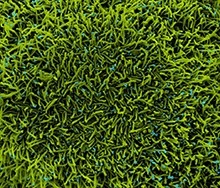
In an editorial published in JAMA: The Journal of the American Medical Association, scientists from the National Institute of Allergy and Infectious Diseases outline the rise of several significant SARS-CoV-2 variants, their potential to affect vaccine protection, and the need for a global approach to fighting the virus as it acquires new mutations.

The Office of Nutrition Research (ONR), first established by the National Institute of Diabetes and Digestive and Kidney Diseases, is being officially transferred to the NIH Office of the Director. The move upgrades the ONR to a trans-NIH initiative, given the broad impact of nutrition on health and disease, and positions the office to enhance engagement of NIH institutes and centers in implementing the 2020-2030 Strategic Plan for NIH Nutrition Research.
| Title | Opportunity number | Extramural Scientific Topics | Release Date | Expiration Date |
|---|---|---|---|---|
|
PAR-21-163 |
|
|
|
|
|
RFA-NS-21-015 |
|
|
|
|
|
PAR-21-160 |
|
|
|
|
|
RFA-RM-21-019 |
|
|
|
|
|
RFA-DE-22-001 |
|
|
|
|
|
PA-21-151 |
|
|
|
|
|
PAR-21-060 |
|
|
|
|
|
RFA-RM-21-011 |
|
|
|
|
|
RFA-DA-22-008 |
|
|
|
|
|
PAR-21-108 |
|
|
|
|
|
PAR-21-099 |
|
|
|
|
|
PAR-21-100 |
|
|
|
|
|
PAR-21-084 |
|
|
|
|
|
PAR-21-068 |
|
|
|
|
|
PAR-21-069 |
|
|
|
|
|
PA-21-071 |
|
|
|
|
|
NOT-OD-18-149 |
|
|
||
|
NOT-NS-21-025 |
|
|
|
|
|
NOT-AR-21-013 |
|
|
|
|
|
NOT-AR-21-014 |
|
|
|
|
|
NOT-NS-21-031 |
|
|
|
|
|
NOT-NS-21-032 |
|
|
|
|
|
NOT-RM-21-018 |
|
|
|
|
|
NOT-MD-21-016 |
|
|
|
|
|
NOT-NS-21-034 |
|
|
|
|
|
NOT-DE-21-001 |
|
|
|
|
|
NOT-AT-21-002 |
|
|
|
|
|
NOT-OD-21-011 |
|
|
|
